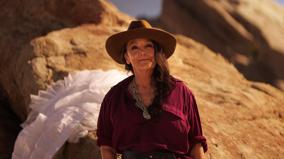Tantoo Cardinal
2020
4 min
Coming soon
Ce portrait touchant de Tantoo Cardinal propose un survol des nombreux rôles qu’a interprétés l’actrice. Il salue sa force, son influence, et le fait qu’elle ait su briser le plafond de verre et survivre à cet exploit.

Details
Ce portrait touchant de Tantoo Cardinal propose un survol des nombreux rôles qu’a interprétés l’actrice. Il salue sa force, son influence, et le fait qu’elle ait su briser le plafond de verre et survivre à cet exploit.
-
recipientTantoo Cardinal
-
scriptDarlene Naponse
-
directorDarlene Naponse
-
director of photographyMathieu Séguin
-
costume designerSage Paul
-
NoneSage PaulFroso TsipopoulouAntoine Combelles
-
makeupDarrell Redleaf
-
hairstylistDarrell Redleaf
-
editingJason Ludwig
-
colour correctionJason Ludwig
-
sound designJohnny Blerot
-
sound mixerJohnny Blerot
-
sound recordistChristian Lainez
-
steadycam operatorDerrick Axtell
-
sound effects creationChris SzottIsael Huard
-
head gripJoel Schaeffer
-
chief electricianAakash Raj
-
transcriptsLisa Clarke
-
translationClaude Dionne
-
subtitlingLisa Clarke
-
principal coordinatorMarcia SeebaranHeather Roberts
-
administratorDevon Supeene
-
studio operations managerDarin Clausen
-
production coordinatorJessica SmithApril DunsmoreTanis Redcrow
-
production supervisionEsther Viragh
-
technical coordinatorDaniel Lord
-
legal counselChristian Pitchen
-
producerCoty Savard
-
executive producerDavid Christensen














